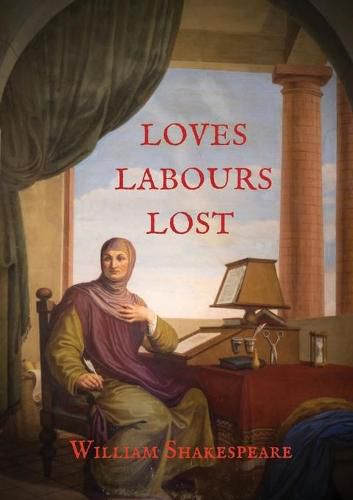Readings Newsletter
Become a Readings Member to make your shopping experience even easier.
Sign in or sign up for free!
You’re not far away from qualifying for FREE standard shipping within Australia
You’ve qualified for FREE standard shipping within Australia
The cart is loading…






This title is printed to order. This book may have been self-published. If so, we cannot guarantee the quality of the content. In the main most books will have gone through the editing process however some may not. We therefore suggest that you be aware of this before ordering this book. If in doubt check either the author or publisher’s details as we are unable to accept any returns unless they are faulty. Please contact us if you have any questions.
LOVE’S LABOUR’S LOST, NOW RECOGNIZED AS ONE OF THE MOST DELIGHTFUL AND STAGEWORTHY OF SHAKESPEARE’S COMEDIES, CAME INTO ITS OWN BOTH ON THE STAGE AND IN CRITICAL ESTEEM ONLY DURING THE 1930S AND 1940S–AFTER NEARLY THREE HUNDRED YEARS OF NEGLECT BY THE THEATER AND MISUSE BY CRITICS. IN THIS NEW CRITICAL EDITION, HIBBARD PAYS PARTICULAR ATTENTION TO THIS PROCESS OF REHABILITATION. BASED ON THE QUARTO OF 1598, AND DRAWING ON RECENT SCHOLARLY ANALYSIS, HE PROPOSES THAT THE QUARTO GOES BACK, PROBABLY BY WAY OF A LOST QUARTO, TO AN AUTHORIAL MANUSCRIPT THAT REPRESENTS THE PLAY IN A STATE PRIOR TO FAIR COPY. HE OFFERS NUMEROUS ORIGINAL READINGS OF DIFFICULT AND DISPUTED PASSAGES, AND A HELPFUL COMMENTARY TO THE PLAY’S SCINTILLATING LANGUAGE.
At first glance, Shakespeare’s early comedy Love’s Labor’s Lost simply entertains and amuses. Four young men (one of them a king) withdraw from the world for three years, taking an oath that they will have nothing to do with women. The King of Navarre soon learns, however, that the Princess of France and her ladies are about to arrive. Although he lodges them outside of his court, all four men fall in love with the ladies, abandoning their oaths and setting out to win their hands.The laughter triggered by this story is augmented by subplots involving a braggart soldier, a clever page, illiterate servants, a parson, a schoolmaster, and a constable so dull that he is named Dull. Letters and poems are misdelivered, confessions are overheard, entertainments are presented, and language is played with, and misused, by the ignorant and learned alike.At a deeper level, Love’s Labor’s Lost also teases the mind. The men begin with the premise that women either are seductresses or goddesses. The play soon makes it clear, however, that the reality of male-female relations is different. That women are not identical to men’s images of them is a common theme in Shakespeare’s plays. In Love’s Labor’s Lost it receives one of its most pressing examinations.
$9.00 standard shipping within Australia
FREE standard shipping within Australia for orders over $100.00
Express & International shipping calculated at checkout
This title is printed to order. This book may have been self-published. If so, we cannot guarantee the quality of the content. In the main most books will have gone through the editing process however some may not. We therefore suggest that you be aware of this before ordering this book. If in doubt check either the author or publisher’s details as we are unable to accept any returns unless they are faulty. Please contact us if you have any questions.
LOVE’S LABOUR’S LOST, NOW RECOGNIZED AS ONE OF THE MOST DELIGHTFUL AND STAGEWORTHY OF SHAKESPEARE’S COMEDIES, CAME INTO ITS OWN BOTH ON THE STAGE AND IN CRITICAL ESTEEM ONLY DURING THE 1930S AND 1940S–AFTER NEARLY THREE HUNDRED YEARS OF NEGLECT BY THE THEATER AND MISUSE BY CRITICS. IN THIS NEW CRITICAL EDITION, HIBBARD PAYS PARTICULAR ATTENTION TO THIS PROCESS OF REHABILITATION. BASED ON THE QUARTO OF 1598, AND DRAWING ON RECENT SCHOLARLY ANALYSIS, HE PROPOSES THAT THE QUARTO GOES BACK, PROBABLY BY WAY OF A LOST QUARTO, TO AN AUTHORIAL MANUSCRIPT THAT REPRESENTS THE PLAY IN A STATE PRIOR TO FAIR COPY. HE OFFERS NUMEROUS ORIGINAL READINGS OF DIFFICULT AND DISPUTED PASSAGES, AND A HELPFUL COMMENTARY TO THE PLAY’S SCINTILLATING LANGUAGE.
At first glance, Shakespeare’s early comedy Love’s Labor’s Lost simply entertains and amuses. Four young men (one of them a king) withdraw from the world for three years, taking an oath that they will have nothing to do with women. The King of Navarre soon learns, however, that the Princess of France and her ladies are about to arrive. Although he lodges them outside of his court, all four men fall in love with the ladies, abandoning their oaths and setting out to win their hands.The laughter triggered by this story is augmented by subplots involving a braggart soldier, a clever page, illiterate servants, a parson, a schoolmaster, and a constable so dull that he is named Dull. Letters and poems are misdelivered, confessions are overheard, entertainments are presented, and language is played with, and misused, by the ignorant and learned alike.At a deeper level, Love’s Labor’s Lost also teases the mind. The men begin with the premise that women either are seductresses or goddesses. The play soon makes it clear, however, that the reality of male-female relations is different. That women are not identical to men’s images of them is a common theme in Shakespeare’s plays. In Love’s Labor’s Lost it receives one of its most pressing examinations.